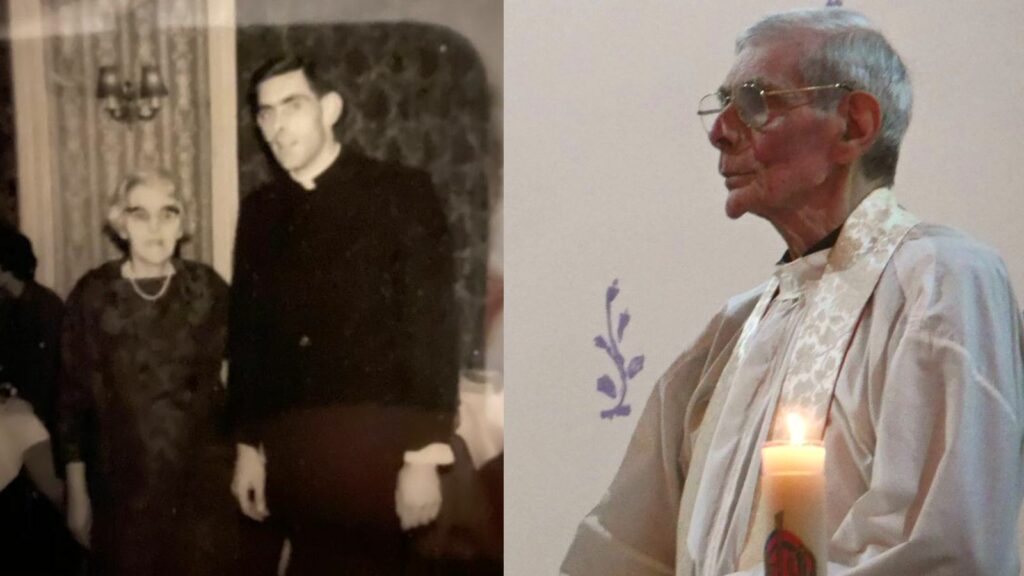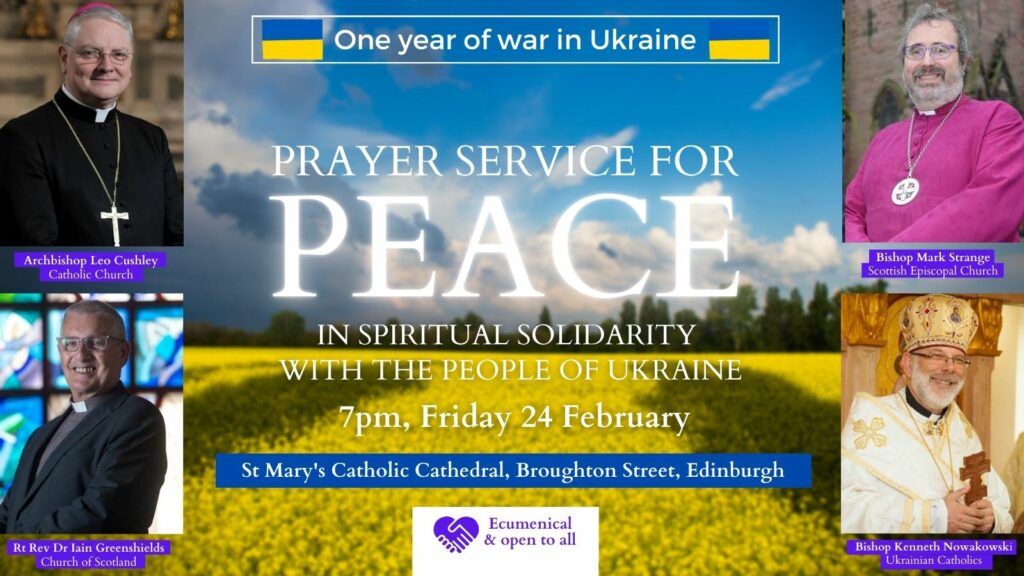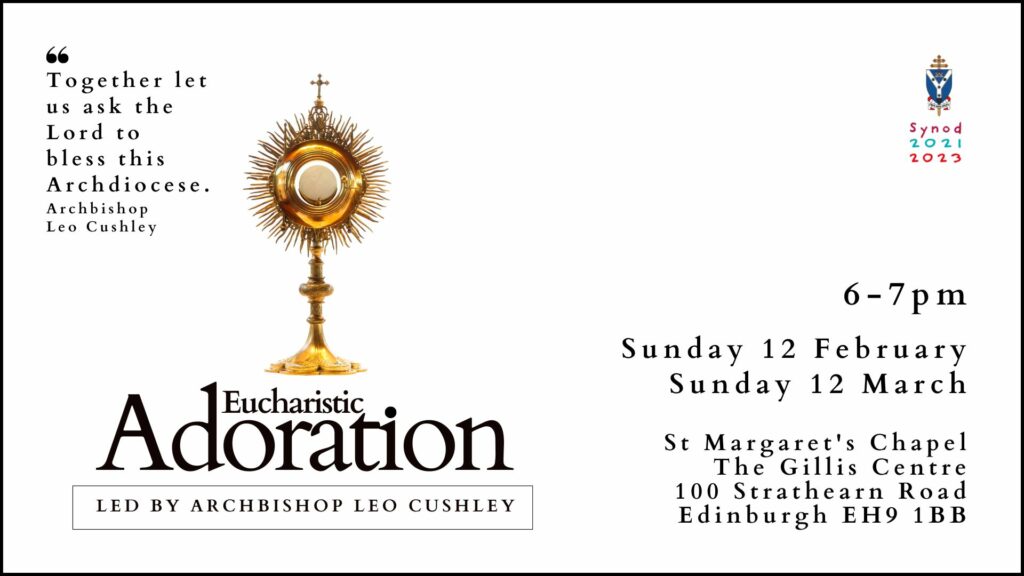The funeral Mass of Canon Bill Conway took place today (Friday 27 January) at St Machan's in Lennoxtown. May he rest in peace.
Homily of Archbishop Leo Cushley of St Andrews & Edinburgh
My dear brothers and sisters in Christ,
A very warm welcome to you all on the sad occasion of the funeral of Canon William Conway.
I’d especially like to greet Bill’s sisters and brother, Anna, Maureen and Laurence, and the members of their families who are with us here today.
I am grateful to Canon Bath and the people of St Machan’s for their welcome here, and to Canon Holuka who has done so much to prepare today, and who will continue to look after Bill’s affairs until everything here is concluded.

Canon Richard and the family chose the readings that we’ve listened to, and they are chosen to remind us of something of the man that Bill was, of his faith, and of his life of service to the people and future clergy of St Andrews & Edinburgh.
The first reading from the prophet Isaiah evokes eternal life in a calm and reassuring scene on a hilltop, and as an eternal banquet.
The joy of a festive banquet is a theme found quite often in both the Old and New Testaments.
The image more specifically of a wedding feast is something that is used more than once by the Lord Himself, and it lets us see and feel the anticipation of God’s welcome to us, the great joy in the occasion, and the super abundance of God’s love for us.
All are welcome here, even if death and life are intertwined in our human condition, along with love and loss, and there is the gentle suggestion that, if we never lost someone or something precious to us, we might never learn to love, and never grow into the fullness of our humanity that God wishes for us.
Goodness
Bill lived a long and, I believe, a happy life, but we know it was not without its losses.
As many of us are aware, one of the things Bill was to lose for a long part of his later life was the natural and very human pleasure of eating and drinking normally.
He had to feed himself in a way that practically meant tasting little or nothing of what nourished him, from before I came to know him some ten autumns ago.
He bore illness with remarkable stoicism and forbearance
This happened due to an illness that he bore with remarkable stoicism and forbearance, at least in what I saw of him.
He wasn’t able to eat and drink as most people do, but he nevertheless had the forbearance and the goodness to continue to attend meals, and the humility to let his food be prepared in a different way while others around him enjoyed the normal pleasures of such things.
He never omitted to join the senior clergy when we gathered for dinner or indeed the luncheons for retired priests, and was of good cheer among us, enjoying what he could of the moment and camaraderie of his old friends, without fuss or fanfare.
It is, therefore, at least a small comfort to picture him, beside the Lord, at the great banquet of life and love and comfort that await those who are faithful to Christ, the Bridegroom.
The second reading from St Paul’s letter to the Romans is a reminder of our baptism into Christ’s death and our connection to the Lord through word and sacrament.
Priesthood
Those connections, initiated and fostered, not here in Lennoxtown, but in New Stevenson, brought Bill into the orbit of the Church from his youngest years and set him, gradually, eventually, on the path to the priesthood.
Ordained in 1968 for St Andrews & Edinburgh, he served all over this Archdiocese: from Falkirk to Jedburgh, from Loanhead and Edinburgh to Denny and Lennoxtown.
A significant time in his ministry was his 14 years teaching Sacred Scripture to the seminarians of St Andrew’s College, Drygrange.
All of this took place, starting with the faith of his family and godparents and the journey of conforming himself to Christ crucified that begins for all believers in Baptism.
St Paul adds, “If in union with Christ we have imitated his death, we shall also imitate him in his resurrection.”
He was surely imitating the Lord and his sufferings with the greatest patience and simplicity.
The last time I saw Bill, in Glasgow Royal Infirmary a few hours before he died, he was surely imitating the Lord and his sufferings with the greatest patience and simplicity.
When the wonderful staff there had finished readying him, we had a slow and difficult conversation, and when we had finished, he asked for my blessing.
Those were my last words to him, and I left him to continue the last few paces of his journey.
As Bill imitated the Lord in his death, may the Lord likewise grant Bill to rise with him in life.
The Gospel reading from St John chapter 5 is one that we don’t hear very often, but it holds several lessons for us from the Lord Himself.
There are two I want to pick up on here: the first is that whoever listens to the Lord’s words and believes in them, will have eternal life.
The second lesson is those who did good will rise again to life.
Scripture scholar
Bill was a scripture scholar, someone with a privileged insight into the Word of God.
He spent much of his life listening to that Word, studying it, deepening his knowledge of it, and not for his own sake, but “doing the good” of sharing it with his students, those who would eventually become his brother priests.
The good that we learn from our teachers and the good we pass on from them surely counts not only in our favour but in theirs. And a way of paying our debt to our teachers is to pass on the best of whatever we learned from them.
It ensures the tradition of the faith down through the years; but, more importantly on this occasion, it reminds of the good they did.
The Lord assures us today that those who listen to His voice, and who do good as a consequence, will rise to eternal life.
This is what we pray for our brother Bill, as we commend him to almighty God and to the mercy of the risen Lord.
Eternal rest grant unto him O Lord, and let perpetual light shine upon him. May he rest in peace. Amen.


